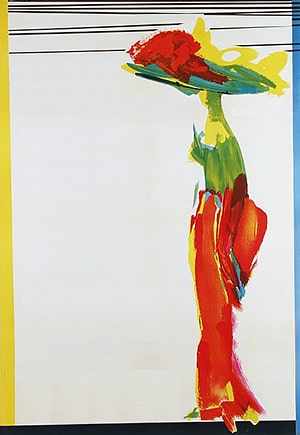Georgette
| Georgette | |
|---|---|
 Original film poster, without text | |
| Directed by | Vary Delgeş |
| Written by | Vary Delgeş |
| Starring |
|
| Distributed by | National Cooperative Confederation |
Release date | 13 April 1964 |
Running time | 50 minutes |
| Country | Gylias |
| Language | French |
| Budget | Ŧ500.000 |
| Box office | Ŧ10 million |
Georgette is a 1964 Gylian film, directed by Vary Delgeş and starring Adélaïde Maillette. It portrays scenes from the life of Georgette Chatelain, a middle-class woman with a conformist personality.
Although the film's critical reception was lukewarm, its ambiguous viewpoint made it a subject of debate, and it became an unexpected financial success. It inspired the term georgette to refer to Gylias' post-Golden Revolution middle class and related subculture.
Plot
Georgette Chatelain, a professionally-qualified young woman, lives in Lænas and works for the municipal council. At work, she is friends with Lisa, an easily-bored worker who often idles at her desk. At home, she is married to Jean Bourgeois, a loving but unimaginative husband with whom she leads a rather monotonous lifestyle.
Georgette picks up a friend's daughter, Lesari, from school. The two play tag in a local park until they're exhausted, and then lie on the grass talking. Georgette brings Lesari to her home, and then goes to hers. She has dinner with her husband, followed by sex.
The next day at work, Georgette's disciplined work draws the envy of Lisa. Lisa jokingly tries to distract her, which Georgette brushes off with tongue-in-cheek. During a cigarette break, Lisa convinces her to buy champagne. That night, Georgette and Jean drive outside the city to stargaze. They identify constellations and share memories and anecdotes from their courtship and marriage.
On a day off, Georgette buys new clothes, and stops in a narrow alley to smoke. She has an encounter with a Revolutionary Youth Union member, and later witnesses police arresting a belligerent Front for Renewal of Order and Society member. She throws her cigarette in a bin and heads home.
Cast
- Adélaïde Maillette as Georgette Chatelain
- Ryða Far as Jean Bourgeois
- Kaþrin Raḑvel as Lisa
- Antónia Silva as Lesari
- Niţa Réma as Revolutionary Youth Union member
Production
Vary Delgeş was inspired to write the film by seeing contemporary films depicting the Golden Revolution from the revolutionaries' viewpoint, which made him curious what an outside view would be. He described Georgette's character as "the kind of person who mostly floats through life, has no strong opinions one way or the other."
Production could not begin until the role of Georgette was cast. Adélaïde Maillette won the part, impressing Vary with her "quiet warmth" and Levystile wardrobe. Niţa Réma was an actual Revolutionary Youth Union member who met Vary as the scene was about to be filmed, and volunteered to appear for free.
Filming lasted 3 weeks, and was done on location in Lænas without a crew. Vary and the cinematographer were the only people present. Filming equipment was rented rather than purchased, resulting in some scenes changing aspect ratio and appearance. Adélaïde commented her favourite scenes to film were those with Antónia Silva.
Most of the film's sound was dubbed in post-production. For certain scenes, Adélaïde added a voiceover representing Georgette's inner monologue.
Initially intended for release on 6 April 1964, the film's premiere was delayed by a week for additional editing.
Reception
Georgette premiered on 13 April 1964. It received mixed reviews in the media. A common criticism was the "plodding and aimless" feel produced by the film's unstructured plot, while Adélaïde, Antónia, and Kaþrin's acting received the most praise.
The ambiguous viewpoint of the film made it a subject of debate — whether it was for or against the Golden Revolution, whether it celebrated or criticised Georgette's bourgeois conventionalism. This sustained public interest and helped earn steady attendance throughout the year, making it an unexpected financial success.
In a retrospective feature, Gylias Review described the film as "a historical curio", commenting that "it may be the georgette's first appearance on screen, but it lacks the impish fun and playfulness that Sima Daián made definitive."
Legacy
The popularity of the film inspired the use of "georgette" as a gender-neutral term describing ordinary Gylians who passively accepted the Golden Revoltion.
The tartan-patterned, chequered suit and hat Adélaïde wore in much of the film became a popular clothing item, often nicknamed the "georgette suit".